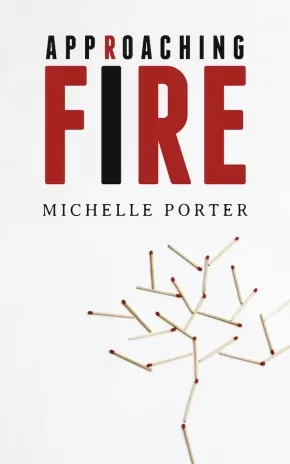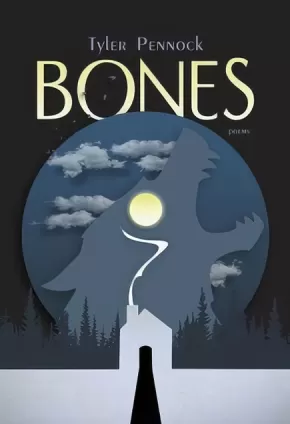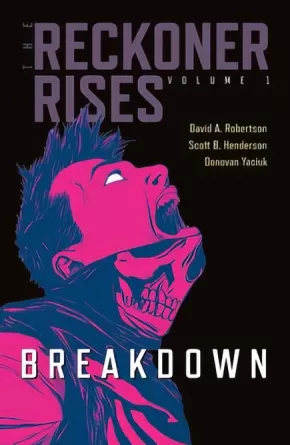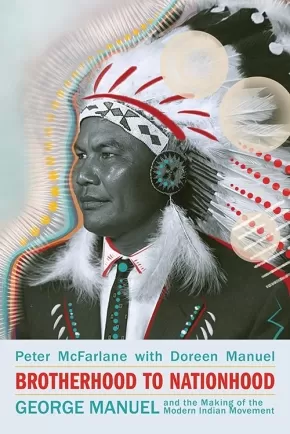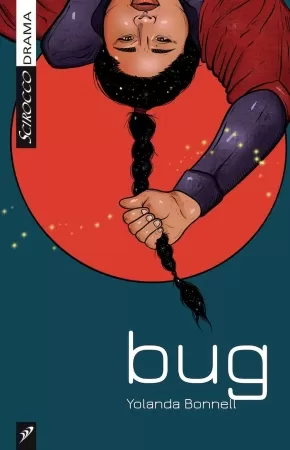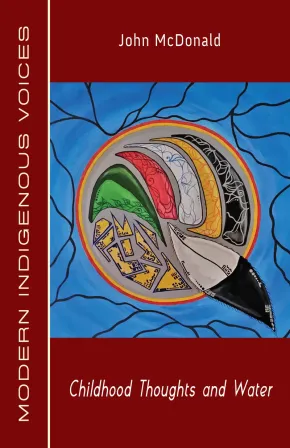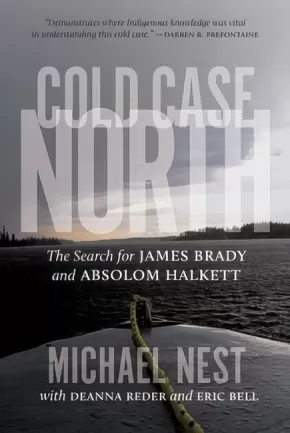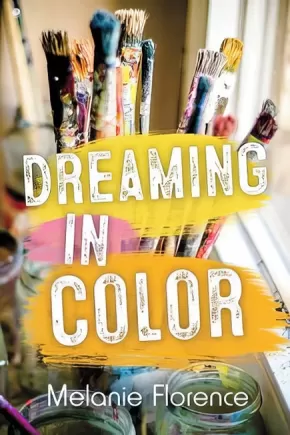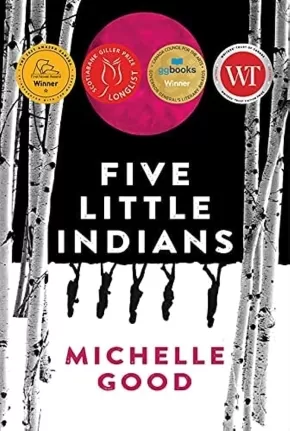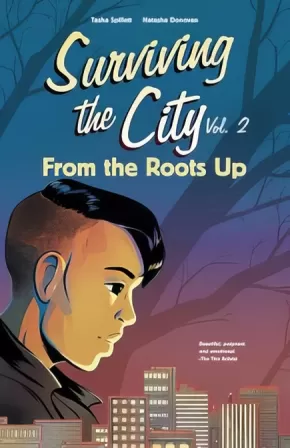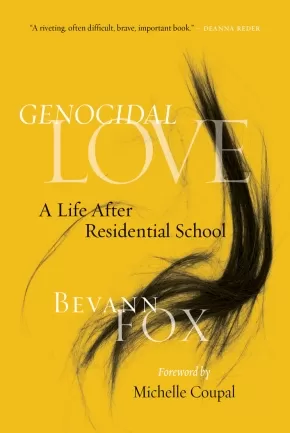
Indigenous Peoples in Canada
451
-
465
of
883 Results;
Sort By
Go To
of 59
Approaching Fire
$19.95
Format:
Paperback
Text Content Territories:
Indigenous Canadian; Métis;
Reading Level: N/A
ISBN / Barcode: 9781550818536
Synopsis:
Synopsis:
In Approaching Fire, Michelle Porter embarks on a quest to find her great-grandfather, the Métis fiddler and performer Léon Robert Goulet. Through musicology, jigs and reels, poetry, photographs, and the ecology of fire, Porter invests biography with the power of reflective ingenuity, creating a portrait which expands beyond documentation into a private realm where truth meets metaphor.
Weaving through multiple genres and traditions, Approaching Fire fashions a textual documentary of rescue and insight, and a glowing contemplation of the ways in which loss can generate unbridled renewal.
Awards
- The Miramichi Reader's 2020 Most Promising Author Award
Reviews
“I wanted to write in a magical and poetic voice, but more than that I wanted to read magical books - true and straight up poetic stories that fulfill the past. Michelle is such a writer. This book is the art Louis spoke of that begins a much needed conversation: Métis nation or Manitoba?” - Lee Maracle
“I've never read a book quite like this before… Approaching Fire is a documentary you can hold in your hands, in which, rather than being a passive witness to scenes unfolding, you become immersed in a river of poetry. Author Michelle Porter uses a mixture of genres to create an account of her journey to uncover the history of her Métis roots, stretching from Newfoundland to British Columbia, Alberta to Saskatchewan, and finally digging deeply into Manitoba. Michelle travels through the stories she was raised on, using them as a base from which to understand the accounts of others, learning all she can about her Great Great Grandfather, Léon Robert (Bob) Goulet, renowned fiddler and performer. Her Pépé. In his story, her story, a wider history of the Métis people is told. A history of racial discrimination, stolen land rights, and the question of what truly unites and defines Métis identity. This book blazes with poetic beauty, and a voice Canada needs to hear.”— More Books Than Days
Additional Information
192 pages | 5.25" x 8.25" | Paperback
Before the Usual Time: A Collection of Indigenous Stories, Poems and Art
$22.95
Editors:
Format:
Paperback
Text Content Territories:
Indigenous Canadian;
ISBN / Barcode: 9781988989150
Synopsis:
Synopsis:
A collection of words and imagery from diverse voices grounded in the land that explore community in relation to time. Filmmaker/writer, Darlene Naponse, curates a gathering of expression about time that has passed, time that is now and time that comes.
Before the Usual Time features contributions by:
Chuquai Billy
Sherwin Bitsui
Emily Clarke
Craig Commanda
Jessie Fiddler
Lori Flinders
Daniel Groulx
Sy Hoahwah
Ajuawak Kapashesit
Leanna Marshall
Darlene Naponse
Joan Naviuyuk Kane
Dennis Saddleman
Ardelle Sagutcheway
Craig Santos Perez
Cathy Smith
Additional Information
180 pages | 5.50" x 8.50"
Bones
$20.00
Format:
Paperback
Text Content Territories:
Indigenous Canadian; First Nations; Cree (Nehiyawak); Métis;
Grade Levels: University/College;
ISBN / Barcode: 9781771315210
Synopsis:
Synopsis:
Poems about a young two-spirit Indigenous man moving through shadow and trauma toward strength and awareness. Bones, Tyler Pennock's wise and arresting debut, is about the ways we process the traumas of our past, and about how often these experiences eliminate moments of softness and gentleness. Here, the poem's journey inward, guided by the world of dreams, seeking memories of a loving sister lost beneath layers of tragedy and abuse. With bravery, the poems stand up to the demons lurking in the many shadows of their lines, seeking glimpses of a good that is always just out of reach. At moments heartrending and gut-punching, at others still and sweet, Bones is a collection of deep and painstaking work that examines the human spirit in all of us. This is a hero's journey and a stark look at the many conditions of the soul. This is a book for survivors, for fighters, for dreamers, and for believers.
Reviews
"Here is a spare and urgent voice that speaks of 'wounds and beauty,' that gestures to a story of trauma and abuse while offering us a potent journey of self-reckoning and reclamation. Bones entwines brutality with the deepest tenderness and in its clear-eyed way asks us, as poetry must, to re-see the world." --Catherine Bush, author of Accusation and The Rules of Engagement
"Tyler Pennock's poetry unfurls like breath: measured, light, caught, whispering, and vital. It charts memory with a steady hand and unerring allegiance to locating the 'beauty/in terrible things.' Bones addresses the effects of intergenerational, state-sponsored trauma with enviable grace, inscribing and affirming life on the other side of overwhelming pain, abuse, and grief. It carries on, resilient, defiant, gazing at the stars, one breath at a time." --Laurie D. Graham, author of Settler Education
"Tyler Pennock's Bones is a soft meandering through the memories of the narrator's hearthome: a place in which trauma, kinship, abuse, and nostalgia cradle one another in a circle. Here, poetics are deployed to inspect the most minute of objects with such wild abandon that the narrator transplants us into a world rife with sharpness so as to make the image complete, focussed, lifelike, photographic even as he continually 'wish[es he] were like water'. Here we find memory and dream animated in equal measure: two spirits sitting in a basement, a headless mother, a white bear, wihtiko, and a sister slowly vanishing. Lyrical, witty, heart-wrenching, and empowering, Pennock's debut book of poetry is a contemplative epic asking us to ponder the ethics of remembrance in all of its lacings of razing and revitalization." --Joshua Whitehead, author of Full-Metal Indigiqueer and Jonny Appleseed
Additional Information
104 pages | 6.00" x 8.75"
Breakdown
$21.95
Artists:
Format:
Paperback
Text Content Territories:
Indigenous Canadian;
ISBN / Barcode: 9781553798903
Synopsis:
Synopsis:
Acclaimed writer, David A. Robertson, delivers suspense, adventure, and humour in this stunningly illustrated graphic novel continuation of The Reckoner trilogy.
After the events in Wounded Sky, Cole and Eva arrive in Winnipeg, the headquarters of Mihko Laboratories. They are intent on destroying the company once and for all, but their plans are thwarted when a new threat surfaces. When Cole becomes mired in terrifying visions, Eva must harness her newly discovered powers to investigate Mihko without him. Are Cole’s visions just troubled dreams or are they leading him to a horrible truth?
Perfect for fans of superheroes, The Bloodhound Gang returns in this all-new graphic novel series, The Reckoner Rises.
Reviews
“David A. Robertson's powerful Indigenous YA trilogy gets a comic-book continuation, a natural format for the adventures of an anxious teen turned tormented superhero.” - Quill & Quire
Educator & Series Information
Recommended for grades 8 to 12.
This book is part of the graphic novel series, The Reckoner Rises, a continuation of The Reckoner trilogy.
Additional Information
72 pages | 6.50" x 10.00"
Brotherhood to Nationhood: George Manuel and the Making of the Modern Indian Movement
$32.95
Format:
Paperback
Text Content Territories:
Indigenous Canadian; First Nations; Salish; Interior Salish; Secwepemc (Shuswap);
ISBN / Barcode: 9781771135108
Synopsis:
Synopsis:
Charged with fresh material and new perspectives, this updated edition of the groundbreaking biography From Brotherhood to Nationhood brings George Manuel and his fighting tradition into the present.
George Manuel (19201989) was the strategist and visionary behind the modern Indigenous movement in Canada. A three-time Nobel Peace Prize nominee, he laid the groundwork for what would become the Assembly of First Nations and was the founding president of the World Council of Indigenous Peoples. Authors Peter McFarlane and Doreen Manuel follow him on a riveting journey from his childhood on a Shuswap reserve through three decades of fierce and dedicated activism.
In these pages, an all-new foreword by celebrated Mi'kmaq lawyer and activist Pam Palmater is joined by an afterword from Manuel’s granddaughter, land defender Kanahus Manuel. This edition features new photos and previously untold stories of the pivotal roles that the women of the Manuel family played and continue to play in the battle for Indigenous rights.
Reviews
“Brotherhood to Nationhood is more than just a biography of the life of George Manuel; it demonstrates the roots of an Indigenous internationalism and political theory that is grounded in the ethics, knowledge, and practices of the Secwepemc people.” – Leanne Betasamosake Simpson, author of As We Have Always Done
Educator Information
Table of Contents
Foreword - Dr. Pamela Palmater
Preface - Peter McFarlane
Preface - Doreen Manuel
Part I. The Neck of the Chicken
1. Paradise, Paradise Lost, 1960
2. The Hard-Luck Shuswap Kid, 1920–1932
3. White Plague, Red Victims, 1932–1954
4. Local Agitator to Provincial Leader, 1955–1960
5. A Future for Your Children, 1960–1963
Part II. Building the National Movement
6. Community Development and the Arthur Laing Gang, 1965–1967
7. Down the Garden Path: Chretien Andras Consultations, 1968–1969
8. From White Paper to Red Paper, 1969–1970
9. The National Chief
10. The National Indian Philosophy, 1971–1972
Part III. Indian Shogun
11. International Travels
12. Land Title and the James Bay Battle, 1972–1973
13. Red Power
14. Political Eruptions in British Columbia, 1975
15. A Voice for the Fourth World, 1975–1976
16. Back to British Columbia,1976–1977
17. The Peoples’ Movement, 1977–1979
18. Constitutional Express, 1980
Part IV. Final Days
19. European Express, 1981–1982
20. Passing the Torch, 1982–1989
Epilogue
Afterword - Kanahus Manuel
Additional Information
402 pages | 6.00" x 9.00" | Revised, 2nd Edition
Buck Naked Kitchen: Radiant and Nourishing Recipes to Fuel Your Health Journey
$35.00
Format:
Hardcover
Text Content Territories:
Indigenous Canadian; First Nations; Cree (Nehiyawak);
Reading Level: N/A
ISBN / Barcode: 9780735236813
Synopsis:
Synopsis:
Beautiful and delicious gluten-free, grain-free, and dairy-free recipes, fully endorsed by Whole30.
As millions of people know, one of the toughest things about completing the Whole30 is figuring out what to eat the other 335 days of the year. Kirsten Buck, creator of Buck Naked Kitchen, struggled with her weight and chronic eczema for years before she transformed her life through food. She adopted a mostly paleo way of eating--gluten-free, grain-free, dairy-free, healthy fats, no refined sugars--and experienced dramatic weight loss. Soon after she went on to win the first-ever "Next Whole30 Star" competition and is now a certified holistic nutritionist, sharing delicious and beautiful recipes on her blog and Instagram with thousands of fans. From her Pesto Chicken Salad Sandwich for lunch, to Moroccan Lamb Stew for dinner, to the stunning Summer Berry Galette to satisfy your sweet tooth, there is something for every taste. In addition, there are recipe basics for making your own mayo, yogurt, salad dressings, tahini, and more, which prove that healthy eating doesn't have to break the bank.
Reviews
“[Buck Naked Kitchen] combines Kirsten’s education as a certified holistic nutritionist with her background and experience focusing on whole foods and creating healthy, approachable and delicious meals. Not only is every recipe gluten, grain AND dairy-free, did I also mention the Manitoba favourite: chicken tenders and HONEY DILL?! You gotta try it!”—Travel Manitoba
What I see in this book is a woman showing up as her truest, most authentic self, using food to speak to us, to connect with us, and to show us and herself love. Kirsten has brought her journey into the light, and the joy, vibrancy, and newfound confidence with which she both cooks and moves through this world glows through these pages.”—from the Foreword by Melissa Urban, Whole30 Co-Founder and CEO
“There are so many classic recipe staples in Kirsten's cookbook that it deserves a permanent place on every kitchen counter! I felt like she invited me into her home and showed me how to cook nourishing food from scratch. The photography is beautiful and Kirsten's approach to food is so effortless and natural.”—Joy McCarthy, bestselling author of Joyous Health and The Joyous Cookbook
Additional Information
272 pages | 8.25" x 9.31" | Full-colour photos throughout | Hardcover
bug
$15.95
Format:
Paperback
Text Content Territories:
Indigenous Canadian;
ISBN / Barcode: 9781927922668
Synopsis:
Synopsis:
bug is a solo performance and artistic ceremony that highlights the ongoing effects of colonialism and intergenerational trauma experienced by Indigenous women, as well as a testimony to the women's resilience and strength. The Girl traces her life from surviving the foster care system to her struggles with addictions. She fights, hoping to break the cycle in order to give her daughter a different life than the one she had. The Mother sits in Alcoholics Anonymous meetings, recounting memories of the daughter that was taken from her, and the struggles of living on the streets in Northern Ontario. They are both followed by Manidoons, a physical manifestation of the trauma and addictions that crawl across generations.
bug reveals the hard truths that many Indigenous women face as they carve out a space to survive in contemporary Canada, while holding on to so much hope.
Reviews
"bug pulls back the curtain on the falsehood of reconciliation using storytelling and movement, bringing everything we've seen in the news and the history books into the heart and gut." - Mooney on Theatre
Educator Information
Recommended for grades 10 to 12.
Additional Information
80 pages | 5.50" x 8.50"
Childhood Thoughts and Water
$16.95
Format:
Paperback
Text Content Territories:
Indigenous Canadian; First Nations; Cree (Nehiyawak); Plains Cree; Muskeg Lake Cree Nation; Métis;
Grade Levels: 12; University/College;
ISBN / Barcode: 9781772311198
Synopsis:
Synopsis:
Childhood Thoughts and Water is a collection of Beat Poetry, Spoken Word, Performance Art and Lyrical Verse. This is a work which journeys into the memories and events of an Urban Indigenous warrior's struggles to reconnect with a language and culture that is seemingly always almost out of reach. The common theme of reconnecting with nature and with water is interspersed with the imagery of childhood recollections and anecdotes about life and love, aspirations and defeats, and the desire to achieve greatness in spite of the obstacles and barriers inherent in a life lived on the fringes, in the shadows and on the streets, in the spotlight and behind the backstage curtain.
Educator & Series Information
This book is part of the Modern Indigenous Voices series.
Additional Information
80 pages | 5.50" x 8.50" | Paperback
Cold Case North: The Search for James Brady and Absolom Halkett
$24.95
Format:
Paperback
Text Content Territories:
Indigenous Canadian; First Nations; Cree (Nehiyawak); Métis;
Grade Levels: 12; University/College;
ISBN / Barcode: 9780889777491
Synopsis:
Synopsis:
For fans of true crime, an unsolved mystery of missing persons, police conspiracies, and private investigations in an Indigenous community in northern Canada.
Métis leader James Brady was one of the most famous Indigenous activists in Canada. A communist, strategist, and bibliophile, he led Métis and First Nations to rebel against government and church oppression. Brady’s success made politicians and clergy fear him, and he had enemies everywhere.
In 1967, while prospecting in Saskatchewan with Cree Band Councillor and fellow activist Absolom Halkett, both men vanished without a trace from their remote lakeside camp. For 50 years rumours swirled of secret mining interests, political intrigue, assassination, and murder. Cold Case North is the story of how a small team, with the help of a local Indigenous community, exposed police failure in the original investigation, discovered new clues and testimony, and gathered the pieces of the North’s most enduring missing persons puzzle.
Reviews
“This engrossing account charts the efforts of three dedicated people to determine the fate of two missing Indigenous men in the north of Canada. [...] Meticulously researched, this smoothly written tale of injustice showcases the authors’ tenacity and arouses the reader’s indignation. This is a scathing rebuke of the RCMP’s failure to take the case of missing Indigenous people seriously.” —Publisher's Weekly
“Like too many cases involving missing and murdered Indigenous people, authorities failed to ensure that Brady and Halkett’s deaths were properly investigated. This book helps get to the bottom of the fate of these two men, and demonstrates why investigators should never dismiss the knowledge of Indigenous peoples.” —Darren Prefontaine, author of Gabriel Dumont
“Cold Case North is part true crime thriller, part gripping mystery about the disappearance of Métis legend James Brady and Absolom Halkett in northern Saskatchewan. It is also about Indigenous knowledge, investigative incompetence, and the stuff of legend.” —Paul Seesequasis, author of Blanket Toss Under Midnight Sun
“A fascinating search for the truth, Cold Case North unravels the layers of a decades’ old mystery. It is about how communities hold knowledge for generations, and how missing loved ones are never forgotten.” —Katherena Vermette, author of River Woman and The Break
Additional Information
272 pages | 5.00" x 7.00"
Dreaming in Color
$10.95
Format:
Paperback
Text Content Territories:
Indigenous Canadian;
ISBN / Barcode: 9781459825864
Synopsis:
Synopsis:
Jennifer McCaffrey has been working hard on her art for years and is thrilled when she is accepted to a prestigious art school. The school is everything she always thought it would be, mostly. There is one group of kids who seem to resent her and say she only got in because of her skin color. Jen, who loves to create new pieces of artwork that incorporate her Indigenous heritage, finds herself a target when the group tells her to stop being “so Indian”. The night before the big art show at school, Jen’s beading art project is defaced. Jen has to find a way not to let the haters win.
Reviews
“Offers a mirror to the sometimes painful emotions and everyday experiences of Indigenous teens of mixed heritage. A rare and welcome reluctant reader title featuring an Indigenous protagonist.” — Kirkus Reviews
“Through the novel’s accessible language and short chapters, readers of all levels and backgrounds will be able to relate to and learn from Jen’s overcoming racial prejudice and intolerance. Readers will also gain a sense of empathy as they come to understand the struggles faced by Indigenous youth in contemporary society. Highly Recommended.” — CM: Canadian Review of Materials
Educator & Series Information
Recommended for ages 12+
Fry Reading Level: 3.4
Themes: racism, prejudice, standing up to bullies, cultural pride, Indigenous art
Dreaming in Color is a companion novel to the bestselling He Who Dreams (the main character is John's sister).
New, enhanced features (dyslexia-friendly font, cream paper, larger trim size) to increase reading accessibility for dyslexic and other striving readers.
Recommended in the Canadian Indigenous Books for Schools 2020/2021 resource list for grades 6 to 9 for English Language Arts.
This is an Orca Soundings book. Orca Soundings are short, high-interest novels written specifically for teens. These edgy stories with compelling characters and gripping storylines are ones they will want to read.
Additional Information
144 pages | 5.00" x 7.50"
Empire of Wild (PB)
$21.00
Format:
Paperback
Text Content Territories:
Indigenous Canadian; Métis;
ISBN / Barcode: 9780735277205
Synopsis:
Synopsis:
From the author of the YA-crossover hit The Marrow Thieves, a propulsive, stunning and sensuous novel inspired by the traditional Métis story of the Rogarou--a werewolf-like creature that haunts the roads and woods of Métis communities. A messed-up, grown-up, Little Red Riding Hood.
Broken-hearted Joan has been searching for her husband, Victor, for almost a year--ever since he went missing on the night they had their first serious argument. One terrible, hungover morning in a Walmart parking lot in a little town near Georgian Bay, she is drawn to a revival tent where the local Métis have been flocking to hear a charismatic preacher named Eugene Wolff. By the time she staggers into the tent, the service is over. But as she is about to leave, she hears an unmistakable voice.
She turns, and there Victor is. The same face, the same eyes, the same hands. But his hair is short and he's wearing a suit and he doesn't recognize her at all. No, he insists, she's the one suffering a delusion: he's the Reverend Wolff and his only mission is to bring his people to Jesus. Except that, as Joan soon discovers, that's not all the enigmatic Wolff is doing.
With only the help of Ajean, a foul-mouthed euchre shark with a knowledge of the old ways, and her odd, Johnny-Cash-loving, 12-year-old nephew Zeus, Joan has to find a way to remind the Reverend Wolff of who he really is. If he really is Victor. Her life, and the life of everyone she loves, depends upon it.
Reviews
“Empire of Wild will not let you go. Mix werewolves unlike you’ve ever read before with the mythos-expanding struggles of American Gods and blend with Cherie Dimaline’s newest heroine, the complex and wonderful Joan of Arcand, and the result is inventive, engrossing, poetic and thrilling. Empire is Dimaline’s most accomplished book yet.” —Eden Robinson, author of Monkey Beach and the Trickster trilogy
“Cherie Dimaline has written a wondrous and deeply felt novel about hypocrisy, power imbalance and the strange, dangerous space between reality and belief. Dimaline is one of the most honest and fearless writers of her generation, and Empire of Wild is an honest and fearless book.” —Omar El Akkad, author of American War
“A magical, electric novel that merges our modern urban world with the mythology of an uncolonized landscape. Dimaline’s descriptions are vivid and sordid and so, so alive. She creates a whole world of hope and hatred in the figure of a hot man in a ’79 Impala, and then takes you into the woods where a wolf dressed in a fine suit threatens to swallow you whole in disturbingly erudite language. The wonders of Indigenous values and their struggle to survive against insidious Western ideology and culture are framed in a wild adventure that cements Dimaline’s talents as a magical realist provocatrice.” —Heather O’Neill, author of The Lonely Hearts Hotel
“Empire of Wild is doing everything I love in a contemporary novel and more. It is tough, funny, beautiful, honest and propulsive—all the while telling a story that needs to be told by a person who needs to be telling it. The book feels like now, and we need more stories from Native communities to feel that way. She knows this community and this community will know she knows it when they read her, but it will resonate with so many more. Cherie Dimaline is a voice that feels both inevitable and necessary.” —Tommy Orange, author of There There
Educator Information
This book is available in French: Rougarou
Additional Information
320 pages | 5.14" x 7.99" | Paperback
Fatty Legs: A True Story (10th Anniversary Edition) (PB)
$15.95
Artists:
Format:
Paperback
Text Content Territories:
Indigenous Canadian; Inuit; Inuvialuit (Mackenzie Inuit);
ISBN / Barcode: 9781773213507
Synopsis:
Synopsis:
The beloved story of an Inuvialuit girl standing up to the bullies of residential school, updated for a new generation of readers.
Margaret Olemaun Pokiak-Fenton’s powerful story of residential school in the far North has been reissued to commemorate the memoir’s 10th anniversary with updates to the text, reflections on the book’s impact, and a bonus chapter from the acclaimed follow-up, A Stranger at Home. New content includes a foreword from Dr. Debbie Reese, noted Indigenous scholar and founder of American Indians in Children’s Literature, while Christy Jordan-Fenton, mother of Margaret’s grandchildren and a key player in helping Margaret share her stories, discusses the impact of the book in a new preface.
With important updates since it first hit the shelves a decade ago, this new edition of Fatty Legs will continue to resonate with readers young and old.
Reviews
"I highly recommend this book for the discussion it would stir with students...Makes the harrowing residential school stories accessible to youth." — Resource Links
"Presents a unique and enlightening glimpse into the residential school experience and, most importantly, one little girl's triumph over her oppressors." — Quill & Quire
"Fatty Legs is a memoir written to introduce children to the reality of the residential school system and the focus on assimilating Indigenous peoples. The story documents the journey of a young girl who wanted to go to school to learn to read and her realization that school wasn’t what she imagined it to be." — The Dalai Lama Center
Educator Information
Themes: biography; Inuit; Indigenous peoples; Indigenous; arctic; school; self-esteem; abuse; community; prejudice; Canadian content; courage/bravery; right vs. wrong; role reversal; secrets; society; history; bullying; memoir; character education.
This resource is also available in French: Les bas du pensionnat
This resource is also available in its original format: Fatty Legs: A True Story
Additional Information
| 156 pages | 6.50" x 9.00" |
Authenticity Note
This illustrator of this book is not Indigenous; therefore, her artwork is not considered to be Authentic Indigenous Artwork according to Strong Nations Authenticity Guidelines. The archival photos from Margaret Pokiak-Fenton's personal collection, however, are considered to be authentic, which is why the book is labelled as containing Authentic Indigenous Artwork. It is up to readers to determine whether or not the images in this work are authentic for their purposes.
Five Little Indians
$22.99
Format:
Paperback
Text Content Territories:
Indigenous Canadian;
Reading Level: N/A
ISBN / Barcode: 9781443459181
Synopsis:
Synopsis:
Taken from their families when they are very small and sent to a remote, church-run residential school, Kenny, Lucy, Clara, Howie and Maisie are barely out of childhood when they are finally released after years of detention.
Alone and without any skills, support or families, the teens find their way to the seedy and foreign world of Downtown Eastside Vancouver, where they cling together, striving to find a place of safety and belonging in a world that doesn’t want them. The paths of the five friends cross and crisscross over the decades as they struggle to overcome, or at least forget, the trauma they endured during their years at the Mission.
Fuelled by rage and furious with God, Clara finds her way into the dangerous, highly charged world of the American Indian Movement. Maisie internalizes her pain and continually places herself in dangerous situations. Famous for his daring escapes from the school, Kenny can’t stop running and moves restlessly from job to job—through fishing grounds, orchards and logging camps—trying to outrun his memories and his addiction. Lucy finds peace in motherhood and nurtures a secret compulsive disorder as she waits for Kenny to return to the life they once hoped to share together. After almost beating one of his tormentors to death, Howie serves time in prison, then tries once again to re-enter society and begin life anew.
With compassion and insight, Five Little Indians chronicles the desperate quest of these residential school survivors to come to terms with their past and, ultimately, find a way forward.
Awards
- Amazon Canada First Novel Award
- 2020 Governor General's Literary Award for English-language fiction
- 2022 Canada Reads Winner
Educator Information
Winner of the 2018 HarperCollins/UBC Price for Best New Fiction, Michelle Good's Five Little Indians is told from alternating points of view of five former residential school students as they struggle to survive in 1960s Vancouver.
Additional Information
304 pages | 6.00" x 9.00"
From the Roots Up: Surviving the City Vol. 2
$21.95
Artists:
Format:
Paperback
Text Content Territories:
Indigenous Canadian; First Nations; Anishinaabeg; Cree (Nehiyawak);
ISBN / Barcode: 9781553798989
Synopsis:
Synopsis:
Dez and Miikwan’s stories continue in this sequel to Surviving the City.
Dez’s grandmother has passed away. Grieving, and with nowhere else to go, she’s living in a group home. On top of everything else, Dez is navigating a new relationship and coming into her identity as a Two-Spirit person.
Miikwan is crushing on the school’s new kid Riel, but doesn’t really understand what Dez is going through. Will she learn how to be a supportive ally to her best friend?
Elder Geraldine is doing her best to be supportive, but she doesn’t know how to respond when the gendered protocols she’s grown up with that are being thrown into question.
Will Dez be comfortable expressing her full identity? And will her community relearn the teachings and overcome prejudice to celebrate her for who she is?
Educator & Series Information
Recommended for ages 12 to 18.
This is the second volume in the Surviving the City graphic novel series, which is also part of the Debwe Series.
Surviving the City is a contemporary graphic novel series about young Indigenous women navigating their way in an urban environment. It includes these books:
Surviving the City
From the Roots Up
We Are the Medicine
A Teacher Guide is available: Surviving the City Teacher Guide: Exploring Identity, Allyship, and Social Action for Meaningful Change in Grades 7-12
Additional Information
64 pages | 6.50" x 10.00"
Genocidal Love: A Life after Residential School
$21.95
Text Content Territories:
Indigenous Canadian; First Nations; Cree (Nehiyawak);
Grade Levels: 12; University/College;
ISBN / Barcode: 9780889777415
Synopsis:
Synopsis:
How can we heal in the face of trauma? How can we transform intergenerational pain into a passion for community and healing?
Presenting herself as “Myrtle,” residential school survivor and Indigenous television personality Bevann Fox explores essential questions by recounting her life through fiction. She shares memories of an early childhood filled with love with her grandparents—until she is sent to residential school at the age of seven. Her horrific experiences of abuse there left her without a voice, timid and nervous, never sure, never trusting, affecting her romantic relationships and family bonds for years to come.
This is the story of Myrtle battling to recover her voice. Genocidal Love is a powerful confirmation of the long-lasting consequences of residential school violence —and a moving story of finding a path towards healing.
Awards
- 2021 Indigenous Voices Awards winner for Published Prose in English: Creative Nonfiction and Life-Writing
Reviews
“A riveting, often difficult, brave, important book. ” —Deanna Reder, Chair, Department of Indigenous Studies, Simon Fraser University
“A riveting and courageous reflection. . . . Genocidal Love is unique in its detailed account of the often re-traumatizing effects of the legal and bureaucratic barriers of compensation programs predating the Truth and Reconciliation Commission. ” —Jesse Rae Archibald-Barber, editor of kisiskâciwan and co-editor of Performing Turtle Island
“Fox tears beauty from the jaws of genocide, daring to claim love beyond settler imaginings—love that nurtures decolonial futures and makes possible a more just world. ”—Sam McKegney, author of Magic Weapons and Masculindians
Educator Information
A forward from Michelle Coupal explains more about "Genocidal Love—a story that Bevann tells about herself outside the boundaries of what constitutes fiction and non-fiction".
Additional Information
256 pages | 5.00" x 7.00"
Sort By
Go To
of 59

